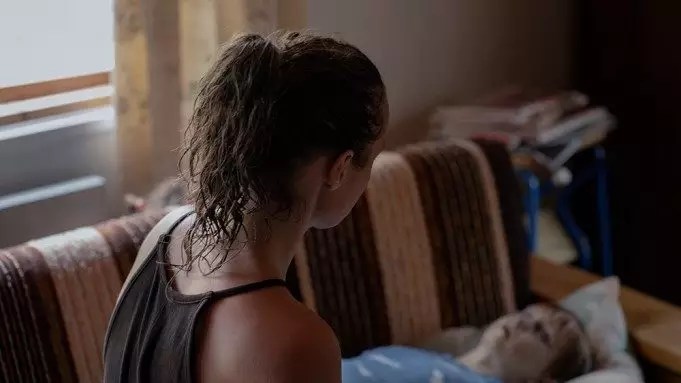In the realm of zombie-themed films, a genre often filled with clichés and predictable plot lines, Handling the Undead aims to stand out as something different. Directed by Thea Hvistendahl, and written by Hvistendahl and John Ajvide Lindqvist, the film takes a subtle approach, diverging from the expected scenes of chaos and horror, while focusing on three families set against a backdrop of an apocalyptic event. The narrative is an exploration of human response to the unimaginable.
The film opens with the camera hovering over a large apartment complex in the middle of a hot Oslo summer. Mahler walks up the stairs to an apartment where his granddaughter is blasting bossa nova music and painting her toenails before getting ready for work. Despite the presence of pictures of a young child, the melancholic energy in the apartment suggests the child isn’t present. This strained relationship forms a significant element of the story.
The film then shifts to Tora, an elderly woman attending the funeral of her beloved Elisbet. After the funeral, Tora catches a cab home and shuts herself off from the world, ignoring all calls. Alone and without her lover, she lives in a perpetual state of mourning, dwelling in her house, consumed by sorrow.
Eva and her teenage daughter Flora also have a strained relationship. While Eva goes out, Flora is instructed to take care of her brother Kian while her father David prepares for his first comedy show. However, their lives are disrupted by an electrical storm that triggers an apocalyptic event. As the dead rise, the film delves into the reactions and emotions of the characters in the face of unimaginable circumstances.
In the landscape of zombie cinema, Handling the Undead emerges as a unique and haunting film. It defies the conventions of the genre, focusing more on drama than jump scares and emphasizing a slow burn rather than immediate chaos. The film explores human emotions and reactions when faced with the return of their loved ones after death.
The film’s strength lies in its narrative, seamlessly connecting three distinct family dynamics. Each family is linked by the common thread of loss and grapples with the return of their deceased loved ones. The story captures a spectrum of human responses, from denial to acceptance and confusion. The transitions between the different stories are fluid, maintaining coherent movement throughout the film.
Handling the Undead excels in its minimalist approach to dialogue, relying on visual storytelling and the use of sound to convey mood. The Norwegian knack for silent storytelling is evident, allowing the emotions of the characters to resonate louder than words. The film’s atmosphere is hauntingly atmospheric, maintaining a somber tone throughout.
As the film progresses, it incorporates more familiar zombie tropes that it did not necessarily need, and there are moments of pacing issues with scenes that don’t significantly move the story forward. However, these minor flaws do not overwhelm the central theme of the film: the necessity of letting go. Handling the Undead serves as a reminder that in death, the essence of our loved ones is forever altered. It explores humanity’s struggle to cope with the return of the dead and how our desperate attempts to cling to the past can lead to our own downfall.
Handling the Undead sets itself apart from the typical zombie-themed films by focusing on a subtle and haunting narrative. It delves into human response to unimaginable circumstances, exploring the spectrum of emotions and reactions when faced with the return of the dead. The film’s minimalist approach to dialogue and reliance on visual storytelling create a captivating atmosphere. Despite some flaws, Handling the Undead serves as a poignant reminder of the importance of letting go and accepting the inevitable changes brought by death.


Leave a Reply